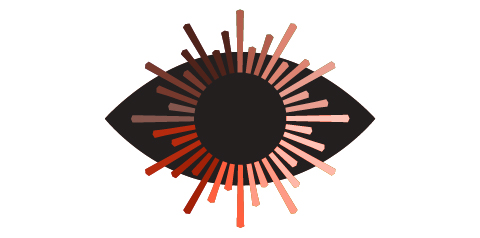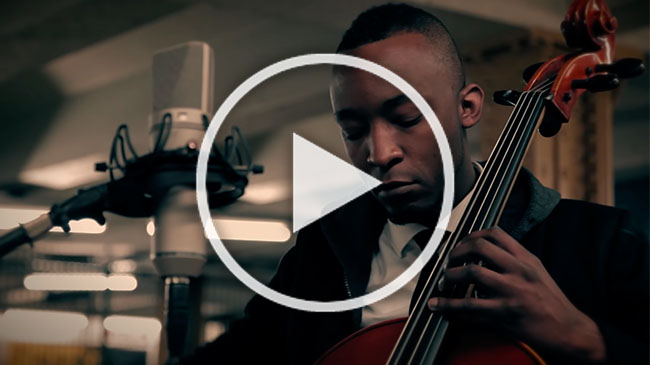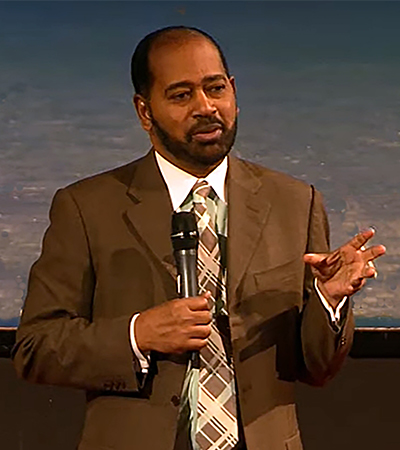Having trouble viewing this email? | View in browser

October 2021
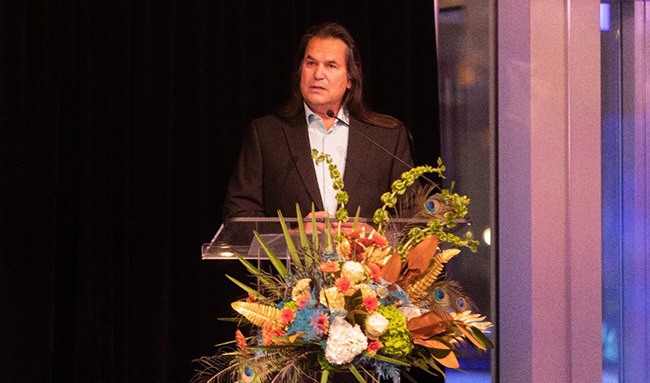
Photograph by Amadou Kromah
Indigenous Peoples’ Day celebrates Native American people
Dan Brown of Ho-Chunk Nation gives introductory comments at Overture’s Take the Stage
Indigenous Peoples’ Day (October 11) is a day of celebration to honor the history and culture of Native American people across the country. The holiday was developed in 2014, the 500th anniversary of Christopher Columbus reaching the Americas. It began as a counter celebration to Columbus Day, which was a celebration of the Italian explorer Christopher Columbus coming to the Americas. Many people rejected celebrating him because they say he represents the violent colonization of the western hemisphere.
We at Overture are proud to celebrate the native people to our area, the Ho-Chunk Nation, as we have developed a long-term relationship with leaders of the Ho-Chunk people. For us, this annual holiday is not something we celebrate once a year, but rather it is an ongoing relationship that has been cultivated and nurtured over many years with the people who are native to the land on which Overture is built. We work closely with Missy Tracy, who is on our Overture Center Foundation Board of Directors and serves as co-chairperson of our Equity and Innovation committee, and we continue to work with Dan Brown, a leader of the Ho-Chunk Nation, who functioned as the primary sponsor and spokesperson at our recent Take the Stage event, where he talked about being honored to work with Overture Center on many programs and initiatives over the years.
In addition, several months before the pandemic, we created a land recognition statement honoring the people and the land on which Overture is built. We use the statement at the beginning of our programs to celebrate the long traditions of the Ho-Chunk people. It demonstrates the great work of our Community Advisory Council, and we’re proud to celebrate the joint cultural history of the Ho-Chunk Nation and Overture Center for the Arts. Our land recognition statement reads as follows:
Overture Center Land Recognition Statement
Overture Center for the Arts celebrates the rich traditions, heritage and culture that thrived long before our arrival. Overture respectfully recognizes this Ho-Chunk land and affirms that we are better when we stand together.
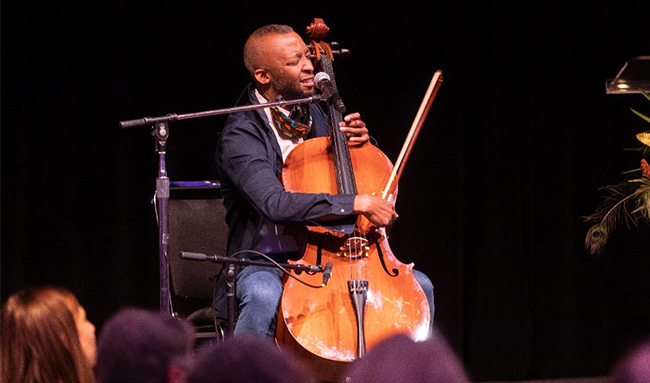
Photograph by Amadou Kromah
Gabriel Royal shines at Take the Stage
During our Take the Stage event on October 3, just over 220 of Overture’s most committed supporters were treated to the perfect culminating performance for the first in-person event many had attended in over 18 months. Singer, songwriter and cellist Gabriel Royal was in rare form and appreciative of the opportunity to perform in a space where he was the focus of everyone’s attention. Discovered in a New York City subway singing and playing his cello for passersby, Gabriel had to get creative when he lost his job as a teacher during the pandemic. As is the case with so many folks, he was just trying to make ends meet and in the process has become one of the top emerging artist for his genre of music.
Gabriel’s style was very laid back and interactive. Everyone in the audience was captivated and engaged. There was a sense of excitement that we were all experiencing something special in our return to in-person performances at Overture. It was such an intimate setting, Gabriel at one point even called his mother on his cell phone while on stage, put her on FaceTime and spoke to her so everyone in the audience could hear and see. A self-proclaimed momma’s boy, he then sang her favorite song with all of us listening intently. He then got back on the phone, told his mother good night and I love you. How endearing and imaginative to share that special moment.
Wisconsin Leadership Summit provides valuable training
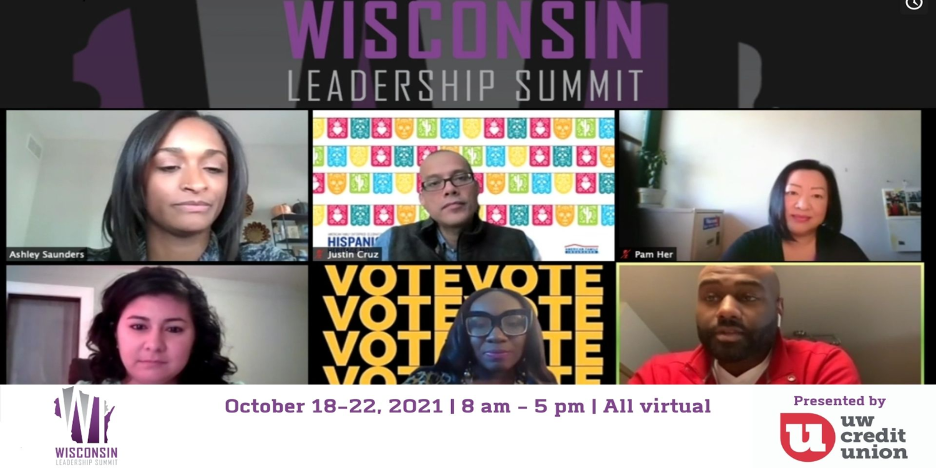
Participation in this year’s Madison 365 Leadership Summit was a rare and unique opportunity for all of us at Overture. It was important for us to hear from people of color in leadership positions across the state and to learn about the various cultures we serve to understand concerns/issues and what different groups value. This experience put us in the position of meeting people where they are, not where we think they are or should be or even where we want them to be.
Why this training experience was valuable for Overture Center:
- If we are to be effective in engaging diverse communities of people in the arts, we must meet people where they are. It is important to be in spaces where people of color from diverse backgrounds can be their authentic selves, a space where they can speak their truth from their perspective, unencumbered by folks who may have a different set of expectations about what it is they expect to hear in the way they expect to hear it.
- It was beneficial to hear a different perspective other than what we traditionally hear from Eurocentric models of thinking about issues and rationales about how to perceive an issue and address it.
- This experience broadened our understanding and expanded our cultural competence. Although the Summit was provided virtually, it engaged us in different way, in a different space. The experience provided practice and, hopefully, a greater sense of comfortability when it comes to being in spaces where there are predominantly people of color leading the discussion. I am sure it helped us to grow in our own individual perspective and broaden our world view. It is healthy to be in non-traditional spaces―that is at the core of being able to embrace equity, diversity and inclusion.
- The sessions were an opportunity to listen and learn. It was about people of color having the opportunity to speak from an authentic place, one that affords them the ability to be themselves and speak about their lived experience and their truth.
Talking About Race: Strategies for Staying in the Conversation
Earnest efforts to have fully engaged, racially centered conversations are often fraught with conflict escalation, verbal withdrawal, emotional cutoff or diversion and distraction. The outcomes of these endeavors are often predictably unpleasant, unfulfilling and, ultimately, unsuccessful.
Dr. Hardy reviewed the concepts and strategies discussed with us in our first two sessions. This workshop used a combination of didactic and experiential role play scenarios to help participants gain practice with and enhance their skills in conducting more effective racially based conversations.
Following
the completion of the training, participants are equipped to:
- Use the VCR Model (the three-step model for engaging in difficult and polarizing conversations that is based on Validate, Challenge, Request) to effectively engage in conversations about race and other dimensions of culture;
- Demonstrate use of the Tasks of the Privilege to effectively engage in conversations about race and culture; and
- Demonstrate use of the Tasks of the Subjugated to effectively engage in conversations about race and culture.
I could not be prouder of the work our organization is doing, challenging ourselves in the area of equity, diversity and inclusion. Dr. Ken Hardy has led us into some very engaging discussions around race, where members of our organization―from board and staff to Community Advisory Council to members of our resident companies―are all engaged in challenging conversations and challenging each other, thinking deeply about our conversations and how we look both introspectively and collectively as an organization at issues about race.
Having concrete strategies for understanding how to lean into discomfort and stay engaged in the conversation is more relevant now than ever as we continue to explore how we overcome the challenges we face in this day and time with race hate in this country. We are still recovering from the aftermath of what happened with George Floyd in Minnesota and countless other people of color. We are still reeling from the episodes and attacks we have seen against members of the Asian community. More than ever, it is imperative to find ways to remove hate, mistrust and misunderstanding and to find ways to become more aware and knowledgeable and to respect each other’s humanity.
The arts experience can be used as a bridge that builds positive community and perspective as we seek to uplift and bring a sense of value and significance of all people. To get better, we must continue to look more closely at ourselves, so we can embrace the diverse communities we intend to serve. The goal of this work is to extend and expand our reach and really find ways to be more engaging and more relevant for different communities in the healing process as we come together around art and culture.
Justice, Equity, Diversity and Inclusion (JEDI) Commitments
1) EMPLOYEES: We are committed to equitable treatment and elimination of social injustice in all its forms throughout the organization to create a workplace that values and welcomes diversity.
- Review all HR policies to eliminate inequities
- Develop intentional recruitment strategies to engage with diverse candidates, with a specific focus on recruiting diverse employees at the director and leadership levels
- Create a comprehensive staff and board education and training plan to establish a deeper knowledge base and understanding regarding racial equity and social justice issues
- Require employees to attend or engage in at least one professional development experience that deepens understanding of diverse cultures, social justice and diversity issues and bring this learning and understanding into the organization
2) LEADERSHIP: We are committed to recruiting and retaining diverse organizational leadership, board, committee and council members.
- Actively participate in at least one external group that promotes professional, educational, cultural or social justice advancement for people of color
- Intentionally engage board, committee and council members in ways that encourage members to maximize their full skills, expertise and experiences to advance Overture’s mission
3) FINANCIAL: We are committed to investing in the activities, programs and initiatives to support an environment that truly provides extraordinary arts experiences for ALL.
- Prioritize funds for artistic programs that explicitly support access for and engagement with diverse populations
- Fund professional development experiences, training and education for staff and board
- Require departments to include at least one diversity, equity and inclusion initiative in their annual plan and budget
- Invest in additional human resources to support the above commitments and tactics
A dashboard will be created to establish, track and communicate metrics, goals and progress.
Community Altar Project promotes healing
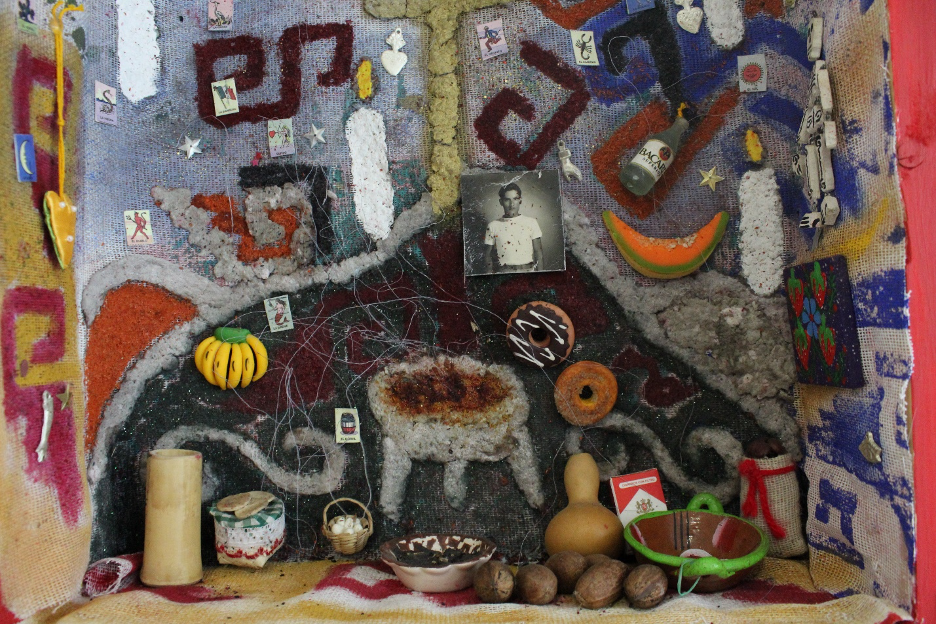
We have suffered a great deal of loss over the last 18+ months due to COVID-19 and its various strains. Overture Center wants to use art and culture to promote healing in our community through the Community Altar Project. Through this project, we are providing a space for people to be heard and to share their grief in a way that is healthy, supported and acknowledged. Altars created by members of the community will be on display in the Rotunda Gallery from Thursday, Oct. 28 through Sunday, Nov. 14.
The hope behind this project is that we can move forward while honoring the loved ones we’ve lost, fostering a better understanding of the grief process and acknowledging we are all in this together. It’s critical that we honor those we love who have passed on and to give ourselves permission to mourn the loss. There is never a perfect way to come together around death and feelings associated with the loss of loved ones. Our goal is to continue to find common ground as people from diverse communities who seek some level of comfort as we move forward beyond our loss. We hope this project builds understanding and brings peace within our community.
The only way to guarantee legitimate tickets is to buy them directly from Overture Center at overture.org, by phone at 608.258.4141, or in person at the Overture Center Ticket Office. Learn more about safe ticket buying.
Update your email preferences here.
If you no longer wish to receive our updates, please click to be removed.
Please do not respond to this email. Click here if you are having trouble viewing this email.
Overture Center for the Arts
201 State Street, Madison, WI 53703
608.258.4141
© 2019 Overture Center for the Arts. All rights reserved.
